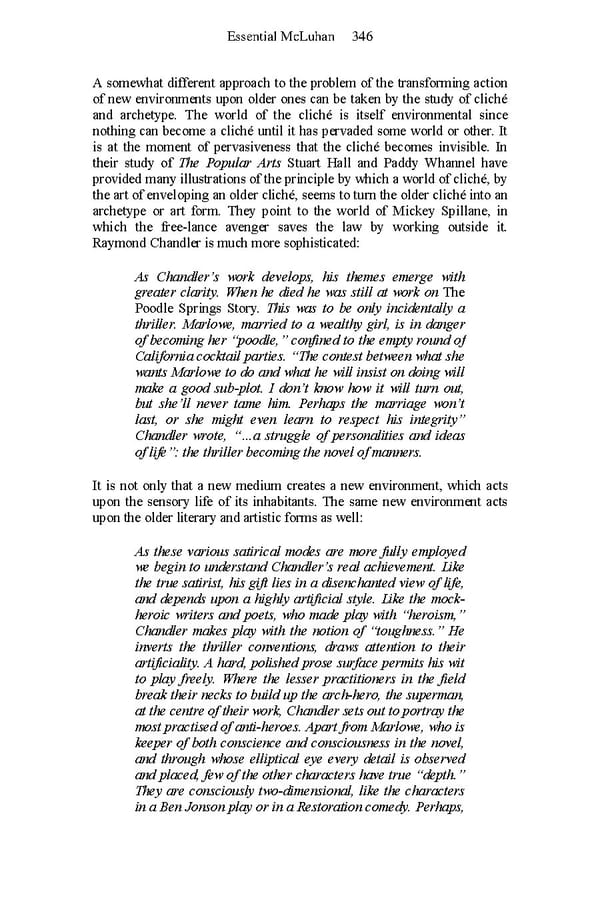Essential McLuhan 346 A somewhat different approach to the problem of the transforming action of new environments upon older ones can be taken by the study of cliché and archetype. The world of the cliché is itself environmental since nothing can become a cliché until it has pervaded some world or other. It is at the moment of pervasiveness that the cliché becomes invisible. In their study of The Popular Arts Stuart Hall and Paddy Whannel have provided many illustrations of the principle by which a world of cliché, by the art of enveloping an older cliché, seems to turn the older cliché into an archetype or art form. They point to the world of Mickey Spillane, in which the free-lance avenger saves the law by working outside it. Raymond Chandler is much more sophisticated: As Chandler’s work develops, his themes emerge with greater clarity. When he died he was still at work on The Poodle Springs Story. This was to be only incidentally a thriller. Marlowe, married to a wealthy girl, is in danger of becoming her “poodle,” confined to the empty round of California cocktail parties. “The contest between what she wants Marlowe to do and what he will insist on doing will make a good sub-plot. I don’t know how it will turn out, but she’ll never tame him. Perhaps the marriage won’t last, or she might even learn to respect his integrity” Chandler wrote, “…a struggle of personalities and ideas of life”: the thriller becoming the novel of manners. It is not only that a new medium creates a new environment, which acts upon the sensory life of its inhabitants. The same new environment acts upon the older literary and artistic forms as well: As these various satirical modes are more fully employed we begin to understand Chandler’s real achievement. Like the true satirist, his gift lies in a disenchanted view of life, and depends upon a highly artificial style. Like the mock- heroic writers and poets, who made play with “heroism,” Chandler makes play with the notion of “toughness.” He inverts the thriller conventions, draws attention to their artificiality. A hard, polished prose surface permits his wit to play freely. Where the lesser practitioners in the field break their necks to build up the arch-hero, the superman, at the centre of their work, Chandler sets out to portray the most practised of anti-heroes. Apart from Marlowe, who is keeper of both conscience and consciousness in the novel, and through whose elliptical eye every detail is observed and placed, few of the other characters have true “depth.” They are consciously two-dimensional, like the characters in a Ben Jonson play or in a Restoration comedy. Perhaps,
 Essential McLuhan Page 352 Page 354
Essential McLuhan Page 352 Page 354